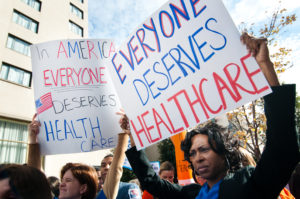Build Anew Series – Health Care

[ad_1]
Present Realities
We have seen too many family members, friends, and neighbors die from a lack of care and critical medicines. Before the COVID-19 pandemic, more than one out of 10 adults in the U.S. knew at least one friend or family member who had died without needed medical treatment because they were unable to pay for it. For people of color, that number is one out of five. Let that sink in.
This is unconscionable — especially in a nation as wealthy as the U.S. Everyone deserves access to health care and prescription medications, but our sinful lack of affordable, comprehensive health insurance and the pharmaceutical industry’s exploitative behavior blocks access to needed medicines and care. It’s no surprise that the leading cause of bankruptcy in the U.S. is medical bills. The soaring costs of health insurance and medical bills, and the egregious raising of prices on needed everyday medicines, reflect an immoral effort to profit from our universal need to be taken care of when we are sick—or to simply live with chronic conditions.
 We also deserve the time to heal from illness and to care for sick loved ones and children without risk of losing our jobs or critical income — which means that paid sick days and medical leave are indispensable. According to the Center for American Progress, the U.S. is the only “industrialized” nation that does not guarantee paid sick days and family and medical leave. This failure to guarantee paid medical leave most acutely impacts lower-income families and the communities who are already most vulnerable in our society.
We also deserve the time to heal from illness and to care for sick loved ones and children without risk of losing our jobs or critical income — which means that paid sick days and medical leave are indispensable. According to the Center for American Progress, the U.S. is the only “industrialized” nation that does not guarantee paid sick days and family and medical leave. This failure to guarantee paid medical leave most acutely impacts lower-income families and the communities who are already most vulnerable in our society.
The U.S. suffers from immoral health disparities, which the COVID-19 pandemic made worse. Black, Latinx, and Native Americans became sick with COVID and died at higher rates than white people across the U.S. But even before the pandemic, because of systemic racism, people of color in this country have long suffered higher rates of mortality and disease (including heart disease) and lower life expectancy than white Americans. A particularly urgent example of these disparities is the Black maternal mortality crisis. Adverse health outcomes are also closely tied to poverty, which is one of the most significant social determinants of physical and mental health.
In addition to one’s ability to access health care, socioeconomic factors like housing, employment status, incarceration, food security, environmental safety, and education all determine a person’s health. This underscores how health care justice is a comprehensive issue that requires accessible and affordable health care, but also justice and transformation across multiple racial, social, and economic dimensions.
Racial and class health disparities are not only unjust and immoral, but they harm everyone. The pandemic made even clearer how our health is tied together: we are all put at risk when any of us is without insurance, access to affordable care, or the ability to take off work when sick or caring for a sick loved one. To end health inequities and promote our common well-being, we must build our unjust healthcare system anew, and ensure that each of us has what we need to best care for our bodies.
[ad_2]
Source link
